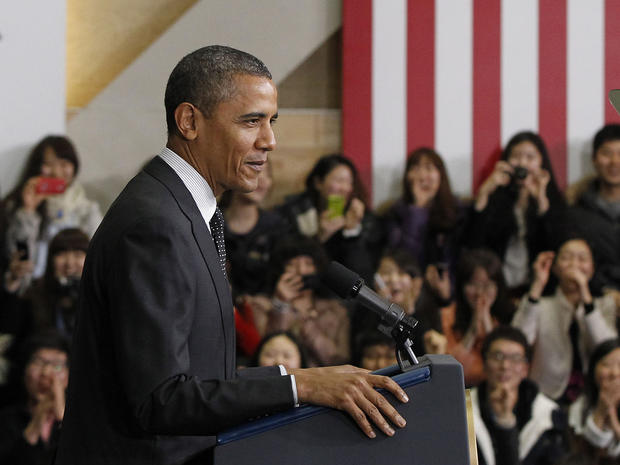Obama: U.S. can afford to have fewer nukes
CBS Radio News White House correspondent Peter Maer is in Seoul, South Korea, covering President Obama's participation in the international nuclear security summit.
(CBS News) SEOUL - Setting the tone for a nuclear security summit, President Obama reiterated Monday his call for a world without nuclear weapons.
Mr. Obama told a university audience in South Korea that the U.S. possesses more nuclear arms than it needs, and can reduce that arsenal without damaging America's security.
The remark will keep the president at odds with Republicans who believe any major cuts in the number of nuclear warheads would weaken the efficacy of the U.S. nuclear deterrent.
Mr. Obama spoke in unusually personal terms about the nuclear challenge.
"I believe the United States has a unique responsibility to act - indeed, we have a moral obligation," Mr. Obama told the university audience. "I say this as President of the only nation ever to use nuclear weapons. I say it as a Commander-in-Chief who knows that our nuclear codes are never far from my side. Most of all, I say it as a father, who wants my two young daughters to grow up in a world where everything they know and love can't be instantly wiped out."
The president argued that the Cold War nuclear stockpile is "poorly suited to today's threats, including nuclear terrorism" - the main theme of the Seoul summit.
Video: U.S. considers sharp cuts to nuclear force
Analysis: A disarmament dream fading fast
189 nations agree to nuke disarmament plan
As the leaders gathered to update efforts to keep "loose nukes" out of the hands of terrorists, the summit agenda was overshadowed by new tensions over the nuclear ambitions of North Korea and Iran.
The president said he was speaking directly to leaders in Pyongyang as he warned that provocations and development of nuclear weapons "have not achieved the security you seek; they have undermined it."
He said further provocations by the North would lead to further isolation, and he challenged North Korea to, "have the courage to pursue peace."
The president called on China, North Korea's only major ally, to use its clout to try and persuade Pyongyang to abandon its nuclear ambitions. Chinese President Hu Jintao offered a vague public response, describing the issue as, "very complicated and sensitive."
But the ever-unpredictable North seemed intent on provocation. The isolated regime has reportedly moved a rocket to a launch pad ahead of a planned test next month.
President Obama and South Korean President Lee Myung-bak say there has been a period of uncertainty since the death of North Korean dictator Kim Jong-il in December. They say it is difficult to determine who's actually calling the shots in North Korea now.
Outside experts agree with that assessment. Victor Cha, an Asia policy expert in the second Bush administration, tells CBS News, "the danger (from North Korea) is even greater today than in the past because of the sudden death of the North Korean leader. The country is now run by this 20-something year old son," Kim Jong-un.
In a message clearly aimed at North Korea and Iran, President Obama spoke of "a new international norm."
"We refuse to consign ourselves to a future where more and more regimes possess the world's most deadly weapons," said the president.
The summit will update international plans to try and keep weapons-grade nuclear materials out of the hands of terrorists. The president said tons of nuclear materials have been removed from vulnerable places around the world, making it "harder than ever for terrorists to acquire nuclear weapons."
But he noted nuclear terrorism remains "one of the greatest threats to global security."
It appears the summit countries will not achieve their reduction targets any time soon. Sharon Squassoni, a nuclear security expert with the Center for Strategic and International Studies, says, despite some progress, "we're still quite a ways away from the original goal of securing all vulnerable nuclear material in four years."
"I don't think you'll get a lot of sexy headlines out of this summit," Squassoni tells CBS Radio News. "What you will get is the kind of boring diplomatic, 'gee, there's continued commitment.'"
